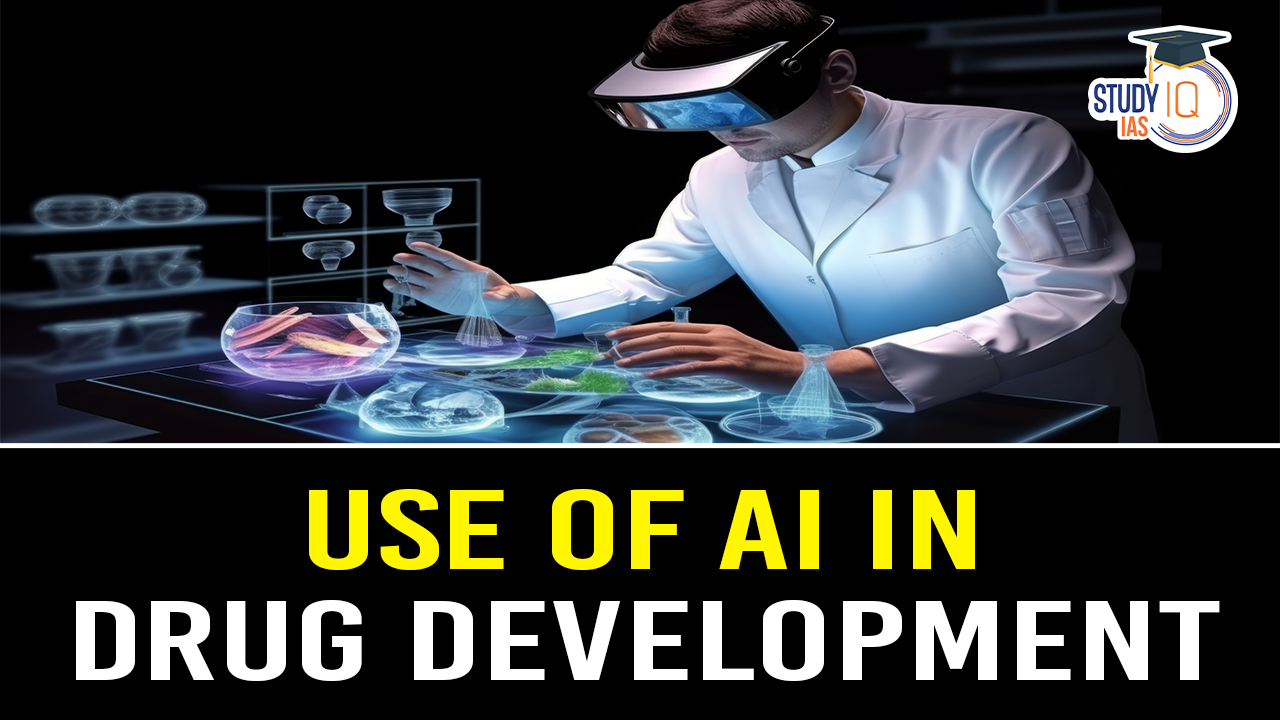Table of Contents
Context: Recently the U.S. Food and Drug Administration (FDA) proposed draft guidelines on AI use in drug development.
- The drug development process is traditionally expensive and time-consuming.
- Artificial Intelligence (AI) has introduced new possibilities to accelerate this process.
Drug Development Process
- Identifying and Validating a Target: The process begins by identifying and validating a biological molecule (target), usually a protein or gene, which the drug will bind to.
- Druggable proteins have specific sites where drugs can dock to exert their effects.
- Discovery Phase: Target proteins are identified, and their sequences are fed into a computer.
- The computer searches for the best-fitting drug from millions of stored small molecule structures.
- This computational process bypasses time-consuming and costly laboratory experiments, reducing failure rates.
- Once a suitable protein target and drug are identified, the research moves to the pre-clinical phase.
- Pre-Clinical Phase: Potential drug candidates are tested on cells and animals for safety and toxicity.
- Clinical Phase: The drug undergoes trials on a small number of human patients for initial testing, followed by more extensive patient trials for efficacy and safety.
- Regulatory Approval and Post-Market Surveillance: The drug is reviewed for regulatory approval and, upon approval, is marketed and monitored for any post-market issues.
How AI Improves Drug Testing
- Drug Discovery Phase:
- AI scans databases containing thousands of chemical compounds.
- It identifies hundreds of promising candidates for further testing.
- Preclinical Research: AI predicts human drug responses using data on:
- How the body absorbs, distributes and eliminates drugs.
- Vulnerable populations (e.g., children) who cannot participate in trials.
- Toxicity prediction:
- AI models can predict the potential toxicity of a drug candidate based on its chemical structure, reducing the need for extensive animal testing.
- Faster development time:
- AI can significantly shorten the drug discovery process by identifying promising candidates more efficiently.
- Reduced costs:
- By optimizing drug design and minimizing the need for animal testing, AI can lower the overall cost of drug development.
Role of AI in Drug Development
Accelerating Target Discovery and Drug-Target Interaction
- AI can significantly reduce the time and cost involved in drug development and increase the accuracy of predictions.
- AI-based prediction tools like AlphaFold and RoseTTAFold have made significant advancements in computational drug development.
AlphaFold and RoseTTAFold
- Developed by DeepMind (Google) and the University of Washington, respectively.
- These tools use deep neural networks to predict the three-dimensional structures of proteins.
- New versions, AlphaFold 3 and RoseTTAFold All-Atom predict interactions for proteins, DNA, RNA, and small molecules with higher accuracy.
- In tests, AlphaFold 3 predicted interactions accurately 76% of the time, compared to 40% by RoseTTAFold All-Atom.
Drawbacks of AI in Drug Development
- Accuracy Limitations: Current Artificial Intelligence (AI) tools can achieve up to 80% accuracy in predictions, which drops significantly for protein-RNA interactions.
- Limited to Early Phases: AI tools primarily assist in the target discovery and drug-target interaction phases, but pre-clinical and clinical phases still need to be completed without any guaranteed success.
- Model Hallucinations: Diffusion-based architectures can produce incorrect predictions due to insufficient training data.
- Code Availability: The code for AlphaFold 3 has not been released, limiting independent verification and broader utilisation.
Challenges and Opportunities in India
- Infrastructure Needs: Developing AI tools requires large-scale computing infrastructure with advanced GPU chips, which are expensive and have quick expiration dates.
- Skill Gap: India lacks the number of skilled AI scientists compared to the U.S. and China, limiting its ability to develop first-mover AI tools for drug development.
- Potential in Pharmaceutical Applications: Despite challenges, India’s growing pharmaceutical sector has the potential to lead in applying AI tools for target discovery, identification, and drug testing.
| About iOncology AI Project |
Goal: Develop an AI-powered platform (iOncology AI) to help oncologists select the most effective treatment for cancer patients based on their genetic makeup.
Key Features
Significance
|


 India’s Next Manufacturing Leap: From ...
India’s Next Manufacturing Leap: From ...
 Stray Dogs in India: Why the Issue Is Cr...
Stray Dogs in India: Why the Issue Is Cr...
 Grammy Awards 2026: Full Winners List, H...
Grammy Awards 2026: Full Winners List, H...

























